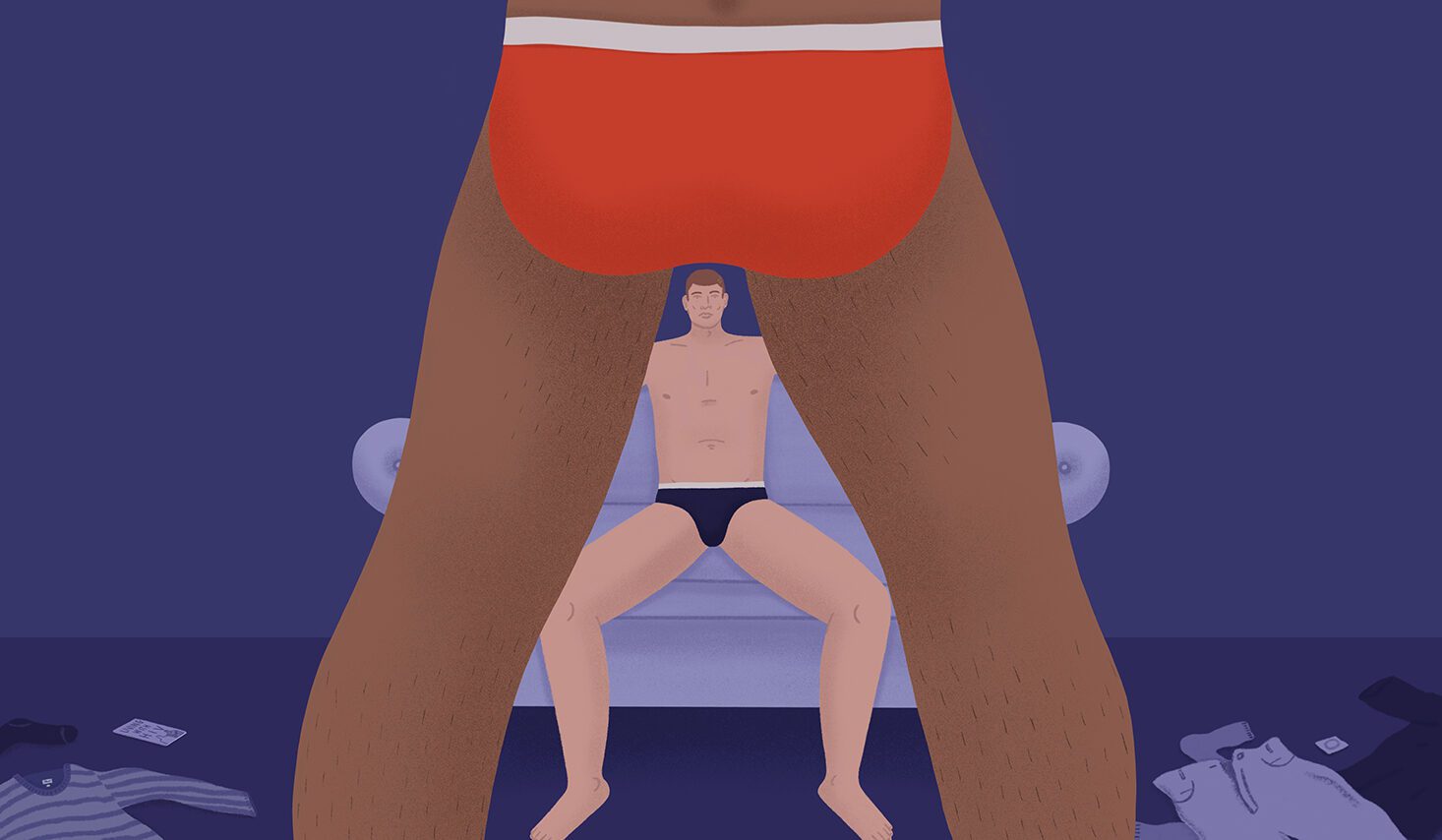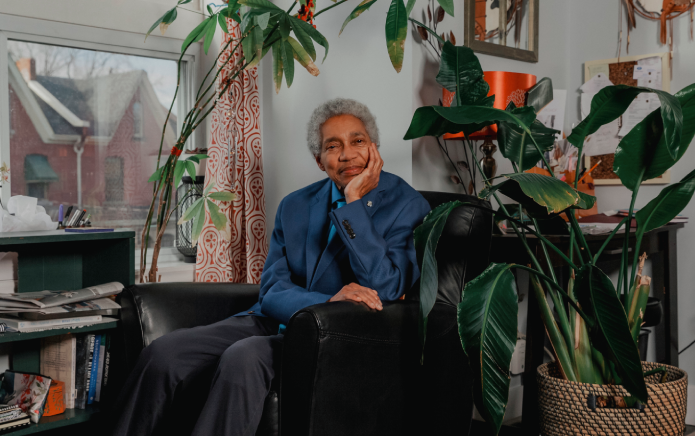
Intimate wellness brand Durex recently released the findings of its #MySexMyWay survey, a first-of-its-kind piece of research conducted earlier this year. The research sought to directly understand the experiences of LGBTQ+ people, revealing both the positive aspects of queer sex, but also the challenges we still face. GAY TIMES has teamed up with Durex to spotlight three young queer writers speaking of their own sexual experiences and how the findings of the #MySexMyWay survey reflect their own journeys, as a way to support others. You can find out more about the survey & results here.
The first time that I had sex, I struggled to make it work. I was an 18-year-old university student and had just come back from a lads’ holiday in Magaluf. I’d been seeing a guy for two months, who was two years older than me. I wasn’t nervous, I was losing myself in foreplay until that (what is now very familiar) moment where you lock eyes with someone and just know what’s about to happen.
I couldn’t do it. Every time I mustered the courage to get to it, I just went a little too limp. Something wasn’t clicking. We did this dance for about ten minutes before we decided to switch roles. It was my first time, something I told him shortly after. He was more upset for me than anything, professing that if he’d known, he would have made it more of an occasion to remember. Instead, we had enjoyed a Saturday night takeaway and classic 2000’s horror films in his bedroom. It was only in recent years that I figured out just why I was so nervous and why I had trouble.
My first memory of exploring my sexuality was when I was 12-years-old. I would spend hours up after ‘going to bed’ watching softcore videos on YouTube. ‘Surfer Boys Kissing’ would be my go-to search, always making sure I deleted the browsing history afterwards, (which was an implication that at the time I viewed this behaviour as something I wasn’t confident of). My self-discovery continued. It was deep in rural Yorkshire at my local library where I found an overlooked donated book containing a gay plotline. Seeing an opportunity, I stole it and read it cover to cover; it was a transformative, quite-gritty adult novel full of promiscuity and sex with strangers that showed me a different world. This opening shifted into an Amazon-fuelled gay erotica rabbit hole; one packed with short storybooks of late-night affairs, making a move on your brother’s fraternity mate… you know, the usual. I only discovered explicit video porn after my first physical time, when I went searching for tips on how to make it a better experience for both myself and my then-boyfriend — something I had to learn myself.
For someone who had grown up in a small town, finding out my sexual partner had HIV on my first one-night stand was quite the way to spotlight the enormous gaps in the school system.
So, it doesn’t surprise me that Durex’s #MySexMyWay survey discovered only 14% of LGBTQ+ respondents found sex education in school a positive experience. With something as personal as sex and identity, it’s important you have access to a variety of outlooks and experiences – something most curriculums just don’t offer. There’s one day that stands out for me, which changed my entire outlook on who I am and forced me to open up about my sexuality – possibly before I was ready. It was a Thursday afternoon and the class of 30 all gathered around for our Citizenship lesson. This was a weekly half-baked class that covered all bases from finance and society to sexual health, without actually teaching you anything that would provide you with any lifelong skills. We were all given stacks of green and yellow cards in the middle of our tables and asked to pick one up for every closed question we were asked. The scenarios posed to us could range from ‘Could you fix your bike chain if it broke?’ to ‘Do you help with DIY around the house?’. In the end, it turns out that the green cards represented a ‘masculine’ answer, while the yellow was ‘feminine’.
Looking back, it’s easy to see why only a third of those LGBTQ+ in Durex’s #MySexMyWay survey feels that sex education is taught in a non-judgemental way. As you perhaps have guessed, all of the
boys held more green cards, and all of the girls had more yellow ones. Except for me — I was the only outlier. We were forced to stand at different ends of the room to show our results and it became clear to me that I was a little different to the teenagers around me.
Since then, my knowledge of sex education has only grown. After turning to porn in my late teens for guidance (something shared with 64% of those LGBTQ+ surveyed by Durex, who reference it as educating them on intimate relations and sexual identity), I began to date. I found very quickly that I am built for monogamy and the first two years of my twenties were spent happily having sex all over the country, and a few places in Europe. We got caught by a Domino’s delivery driver once, in a student house in the heart of Selly Oak, who arrived a little earlier than expected. It turns out he wasn’t the only one.
Having a partner who I placed my trust in allowed us both to explore different sides of sex with no judgement. Kinks, fetishes, positions… it was all consensually on the table. We watched porn together, tried out different toys… I once bulk-ordered flavoured lube sachets. They lasted us months, and I couldn’t order anything that was salted caramel flavoured for about a year afterwards. But this kind of education only goes so far, and, sure, it can be all fun and games when you’re on a twelve-hour deadline and meet in the bathroom of the university library for your self-assigned ten-minute break – but what happens when you find something neither your partner or the education system has prepared you for?
I was diagnosed with HIV in late 2019. I was seeing a different partner by this time and had been for about a year and a half. It was a reluctant ‘We’re probably going to be together for a while’, but we were both young, so we opened the relationship to see how we felt. It was my first time meeting somebody solo and it just so happened that I chose someone who had HIV and wasn’t in control of their status. I didn’t know about this so when I asked if we needed to use a condom, I trusted ‘no’ as ‘no, I’m in control of my sexual health’. For someone who had grown up in a small town, finding out my sexual partner had HIV on my first one-night stand was quite the way to spotlight the enormous gaps in the school system when it comes to teaching us about inclusive sex and relationships education.
I’m now a part of the new wave of sexual health educators on TikTok. I’m creating resources for the next generation.
Since then, I’ve been publicly sharing my status to my close friends through Instagram. In the space of just over a year, this has built to an organic movement encompassing so much more than myself. The most startling realisation is how wrong I was for assuming I was the only young person today living with HIV.
In a way, I’m grateful for the opportunity. I’m now a part of the new wave of sexual health educators on TikTok. I’m creating resources for the next generation to raise awareness of STIs, reduce transmission of HIV, and break down stigmas. The reality is that it only takes one time to catch HIV, and anybody who is not 100% certain of their partner’s STI status is at risk. Sexual activity involves mutual trust and we owe it to ourselves, and our partners, to be in control of every aspect of our health.
I will never transmit HIV for the rest of my life, due to medication that makes my viral load undetectable, meaning, for me and any partners, the virus is untransmittable. Now I feel more confident in the bedroom than I ever have, and more secure in the partners that I choose because there’s a mutual understanding beforehand that we’re both aware of our sexual health. Nobody in charge of themselves will be put off by being asked: ‘When was the last time you were tested for STIs?’ So, while sex education in school didn’t particularly empower me – and only 6% of those LGBTQ+ from Durex’s #MySexMyWay survey thought that it gave them confidence in their sexuality – it’s reassuring to know that our community has each others’ backs. This is how progress is made one person at a time: with confidence in ourselves and communication with each other. I feel more sexually liberated than I ever have; knowledge, and accessible education, truly is power.
